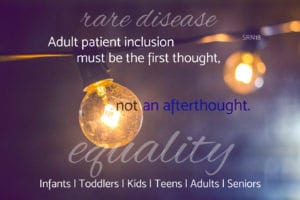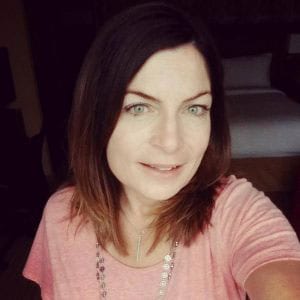
We need to talk about adult rare disease patients.
Adults who have a rare disease diagnosis are faced with a blaring issue– I’m speaking for a large number of adults here, from young adults to seniors.
Look closely at rare disease statistics, literature, images, events, publications, posters, and messaging. Do you lead, work for, or volunteer a rare disease organization whose purpose is to represent and empower the population of rare disease as a whole? Look at your last three major projects. Were adults who have rare disease specifically included in your purpose, messaging, and media kit? Were adults represented equally? Was including adults an afterthought? Be honest with yourself. Was including adults a point of contention?
At events, do you offer tracks or break outs specifically geared for adults who have a rare disease? Equally? Were the necessities, accessibility, and the financial means for patients to attend addressed? Was remote interactive attendance offered for those who can’t physically travel due to their rare disease?
Adults who have rare disease are 50% of the rare disease population.
If your organization or event is developed for everyone who has a rare disease, but your actions don’t include and represent adults equally, change your mission.
Why aren’t adult patients included in statistics, panel discussions, materials, and everything we do?
I recently noticed two pieces widely distributed by organizations whose mission is rare disease. One had photographs of three children. No adults. The other organization touted an inaccurate statistic on a poster, reflecting that children were the vast majority of those who have a rare disease. While images on a media pamphlet may seem like a small thing, this is a reflection of a larger cultural problem. Adults with rare disease don’t see ourselves represented in what we are advocating for.
Too often, we are failing half of our own population. Half.
Everyone is dealing with varying medical, financial, mental, social aspects of rare disease. The difference for adults who have rare disease is that this is happening to our bodies, us personally, our lives – first hand. We are rare disease. Adults must not be left out of the very thing we’re personally fighting. Patients must come first.
We are navigating rare disease while providing our own self-care or requiring a caregiver, which is a feat. We’re researching, finding physicians, calling, scheduling, planning, traveling for our own medical needs. Then, we are the patients: having tests, procedures, scans, IV’s, surgeries, hospitalizations, dealing with effects of medications, looking for therapies and treatments, often traveling large distances regularly, endlessly seeking relief. To save ourselves.
Our efforts are often futile, as our rare disease lacks understanding, treatments, and cures. A lifetime of ongoing, often undiagnosed issues and no answers. The ordeal can be debilitating and devastating. Adult rare disease patients are simultaneously trying to manage everyday adult responsibilities, as well as the rare disease we face. Many of us lose jobs, our careers. Sick days only go so far. Without an income, we can’t afford health care, insurance, treatments, and medications. We exhaust our savings. We become medically bankrupt. Basic needs like food and housing are on the line. If we receive disability benefits, another feat, the money hardly stretches far enough each month. Relationships, family, kids and marriages pay the price. We often have less support to rely on when we’re older. Some rare adults are also parents of children with rare diseases, playing both roles. Our mental health is affected. For many, our bodies are in a personal chronic health crisis, despite our best intentions, efforts, and outlook.
If you haven’t considered the life of adults with rare diseases, shift your perspective. Imagine it’s you. You’re attempting to manage your needs above. Meanwhile you have the flu, nausea again, and maybe your legs aren’t functioning, so you use a wheelchair. Perhaps you can’t drive because of severe muscle spasms, or your vision is impaired, or you are dizzy, or you’ve lost mobility. Your voice, words,and memory are lost. Dementia. Maybe severe chronic nerve pain makes you want to climb the walls, but most days you are in bed. Fatigue. Maybe your hands shake so much you can’t take your medication, or brush your teeth. It’s getting worse. It’s degenerative. You can’t take a shower, wash your hair, get dressed, go to work. Forget about taking your son to basketball practice. How are you going to get to your specialist, get groceries, or prescriptions this week? You are in the hospital again. Your family, your kids, and your spouse need you. You want to be there, and participate. Maybe you’re single. Who will help care for you? How will you pay the bills? Who will help clean your house, do laundry, or mow the lawn? You push, but your body says no. You have many responsibilities, and relying on others is wearing them thin. The mix of ramifications vary, but we handle it day after day. It’s heavy. As an adult, you are dependent upon yourself, or you must depend on a caregiver, yet others depend on you– and you have a rare disease.
Most of us are overcoming this every day. We laugh, we love, we get on, and enjoy as much as possible. We do what we can to live full lives. We also hide it. I’m an upbeat person, but I can tell you, that the scenarios above are this way for many, and at times, it has been this way for me. Let’s take a minute and not sugar coat it.
Are we adequately addressing the adult patient experience in the rare disease space? Are we offering the same support, funding, programs, and emotional understanding?
For some adults, this has been a slow burn, a life-long smoldering process. While others have degenerative conditions that suddenly hit the fan, causing a fast approaching wildfire of fierce destruction in our lives. Regardless, we’re just trying to stay ahead of it. Often we see lives – our lives, or our peers lives – go up in flames. Additionally, we have been snuffed out of the arena that is built for and devoted to rare disease, when we have rare disease.
The status quo is an issue that removes adults with rare disease from the equation. It’s not acceptable or respectful of adults who are living in rare bodies. We also have valid dire concerns. We also lose loved ones, and often peers with the very same diseases that we have. This is tremendously overwhelming for us. As patients with rare disease, we need support, constructive discussions, solutions, the means to attend rare events, and tools, from a different perspective. The patient perspective.
Too often, adults are invisible. We are dismissed and brushed off repeatedly seeking care. Please don’t dismiss us in a space created for rare disease, especially if you want us to participate. As patients, we have the genes; the patient data. These age groups are experts. We know more about our conditions than anyone. We are literally filled with years of experience, information, and quite frankly we are uniquely designed with solutions.
The good news? We can do better. Let’s fix it!
All entities in the rare disease arena must set a new standard today. Always embrace and include adults who have rare disease, with words, actions, statistics, agendas, materials, images, programming, initiatives, events, discussions – the entire scope of work.
People of all ages who have rare disease must be the first thought, not an afterthought. I thank our large and small rare disease entities in advance, for changing the landscape of rare empowerment to include patients of any age, equally.
 About the Author: Sharon Rose Nissley has several rare conditions including Klippel-Feil syndrome, Ehlers-Danlos Syndrome, Cervical Dystonia and Vasculitis. She is a patient advocate for rare disease and founded Klippel-Feil Syndrome Freedom to help those who have this rare, congenital musculoskeletal condition and their families. “I just want to help those affected by rare disease, and empower our community to dig in, learn,and ask for what we need.” Follow her on Twitter: @Rose _of_Sharon8, @KFS_Freedom and Instagram: @Rosiegal8, @kfs_freedom
About the Author: Sharon Rose Nissley has several rare conditions including Klippel-Feil syndrome, Ehlers-Danlos Syndrome, Cervical Dystonia and Vasculitis. She is a patient advocate for rare disease and founded Klippel-Feil Syndrome Freedom to help those who have this rare, congenital musculoskeletal condition and their families. “I just want to help those affected by rare disease, and empower our community to dig in, learn,and ask for what we need.” Follow her on Twitter: @Rose _of_Sharon8, @KFS_Freedom and Instagram: @Rosiegal8, @kfs_freedom


